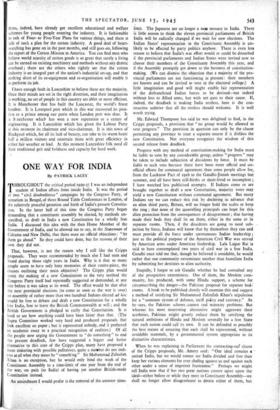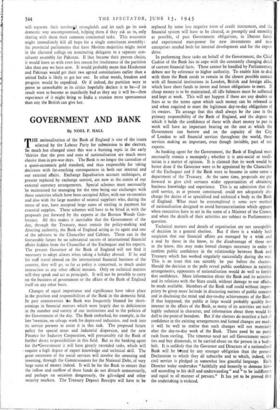ONE WAY FOR INDIA
By PATRICK LACEY
That, however, is not the reason why I stilt like the Cripps proposals. They were recommended by much else I had seen and heard during those eight years in India. Why is it that so many people seem to have only hazy memories of their centre-piece, the clauses outlining their main objective? The Cripps plan would remit the making of a new Constitution to the very method the Congress Party itself had repeatedly suggested or demanded, at any rate before it was taken at its word. The effect would be that after the next provincial elections (to come as soon as the war is over) an assembly of rather more than two hundred Indians elected ad hoc would be free to debate and draft a new Constitution for a wholly free India, free to leave the British Commonwealth at will ; and the British Government is pledged to ratify that Constitution. It is hard to see how anything could have been fairer than that. (The Sapru Committee worked very hard and produced proposals that look excellent on paper ; but it represented nobody, and it preferred an academic essay to a practical recognition of realities.) Of all the people now urging the Government to "do something" to end the present deadlock, few have suggested a bigger and better alternative to this core of the Cripps plan, many have proposed a mere tinkering with possible palliatives, quite a number do not indi- cate at all what they mean by" sometWng." Sir Muhammad Zafrullah Khan is an exception, but he would only bind the work of the Constituent Assembly to a time-limit of one year from the end of the war, on pain (to India) of having yet another British-made Constitution instead.
An amendment I would prefer is the removal of the anterior time-
limit The Japanese are no longer a neer menace to India. There is little reason to think the eleven provincial parliaments of British India will be radically changed if we wait for new elections. The Indian States' representation in the Constituent Assembly is un- likely to be affected by party politics anyhow. There is even less reason to believe that India's war effort would or could be disturbed if the provincial parliaments and Indian States were invited now to choose. their members of the Constituent Assembly this year, and if the Assembly promptly got down to the business of constitution- making. (We can dismiss the objection that a majority of the pro- vincial parliaments are not functioning at present : their members are luiown and can be invited to vote in the electoral college:) A little imagination and good will might enable fair representation of the disfranchised Indian forces to be devised—not indeed without loss to Allied arms, but with net gain to their cause. If, indeed, the deadlock is making India restless, here is the con- structive sedative that all the restless should welcome. It is well worth trying.
Mr. Edward Thompson has said he was delighted to find, in the Cripps proposals, a provision that "no group would be allowed to veto progress." The provision in question can only be the clause permitting any province to steer a separate course if it dislikes the new Constitution. Not everyone recognises the wisdom of this
second release from deadlock. -
Progress with any method of constitution-making for India must be liable to veto by any considerable group, unless " progress " may be taken to include subjection of dissidents by force. It must be Liable to such veto because there have been more official and un- official efforts for communal agreement than some people allow for, from the Lucknow Pact of 1916 to the Gandhi-Jinnah meetings last summer, and all have been still-births or short-lived or incomplete ; I have watched less publicised attempts. If Indians come or are brought together to draft a new Constitution, majority votes may yield a new Constitution without communal agreement. But many Indians say we can reduce this risk by declaring in advance that an alien third party, Britain, will no longer hold the scales or keep the ring ; that none of the quarrelling principals can hope for this alien protection from the consequences of disagreement ; that having made their beds they shall lie on them, either in the same or in separate rooms. Then, if the dissidents are going to need sub- - jection by force, Indians will know that by themselves they can and must provide all the force under spontaneous Indian leadership ; just as the political purpose of the American Civil War was served by American arms under American leadership. Lala Lajpat Rai is said to have contemplated two years of civil war in a free India. Gandhi once told me that, though he believed it avoidable, he would rather that one community exterminate another than humiliate India by submitting her destinies to alien authority.
Stupidly, I forgot to ask Gandhi whether he had consulted any of the prospective exterminees. One of them, the Moslem com- munity, has produced, with some Hindu support, a scheme for circumscribing the danger—the Pakistan proposal for separate bed: rooms. A book to be published shortly will examine this and suggest a method of satisfying Sir Muhammad Zafrullah Khan's stipulation for a "common system of defence, tariff policy and currency." As he -says, the Pakistan scheme 'cannot end minority problems. But whereas his most interesting alternative might aggravate their acerbities, Pakistan might greatly reduce them by satisfying the natural ambitions of Hindu and Moslem severally for a free State that each nation could call its own. It can be defended as possibly the best means of ensuring that each shall be represented, without avoidable trammels, by a governmental system appropriate to its distinctive characteristics.
When he was explaining in Parliament the contracting-ouf clause of the Cripps proposals, Mr. Amery said : "Our ideal remains a ' united India, but we would sooner see India divided and free than keep her various elements for ever chafing against us and against each other under a sense of impotent frustration." Perhaps we might tell India now that if her two great nations cannot agree upon the ideal—either before or while they meet in Constituent Assembly—we shall no longer allow disagreement to detain either of them, but will separate their territoriol strongholds and let each go its ot.vii. domestic way uncompromised, helping them if they ask us to, only sharing with them their common continental tasks. This assurance might immediately kill all hope for a single constituent assembly: the provincial parliaments that have Moslem majorities might insist in the electoral college on nominating delegates to a separate con- stituent assembly for Pakistan. If that became their proven choice, it would leave us with even less reason for intolerance of the partition idea than any we have now. It would probably mean that Hindustan and Pakistan would get their two agreed constitutions earlier than a united India is likely to get her one. In other words, freedom and progress would be expedited. Or if indeed, the partition were to prove so unworkable as its critics hopefully declare it to be—if its result were to become as manifestly bad as they say it will be—then experience of it might bring to India a reunion more spontaneous than any the British can give her.



























 Previous page
Previous page